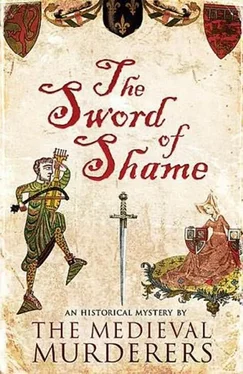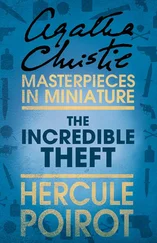The Medieval Murderers - Sword of Shame
Здесь есть возможность читать онлайн «The Medieval Murderers - Sword of Shame» весь текст электронной книги совершенно бесплатно (целиком полную версию без сокращений). В некоторых случаях можно слушать аудио, скачать через торрент в формате fb2 и присутствует краткое содержание. Жанр: Исторический детектив, на английском языке. Описание произведения, (предисловие) а так же отзывы посетителей доступны на портале библиотеки ЛибКат.
- Название:Sword of Shame
- Автор:
- Жанр:
- Год:неизвестен
- ISBN:нет данных
- Рейтинг книги:4 / 5. Голосов: 1
-
Избранное:Добавить в избранное
- Отзывы:
-
Ваша оценка:
- 80
- 1
- 2
- 3
- 4
- 5
Sword of Shame: краткое содержание, описание и аннотация
Предлагаем к чтению аннотацию, описание, краткое содержание или предисловие (зависит от того, что написал сам автор книги «Sword of Shame»). Если вы не нашли необходимую информацию о книге — напишите в комментариях, мы постараемся отыскать её.
Sword of Shame — читать онлайн бесплатно полную книгу (весь текст) целиком
Ниже представлен текст книги, разбитый по страницам. Система сохранения места последней прочитанной страницы, позволяет с удобством читать онлайн бесплатно книгу «Sword of Shame», без необходимости каждый раз заново искать на чём Вы остановились. Поставьте закладку, и сможете в любой момент перейти на страницу, на которой закончили чтение.
Интервал:
Закладка:
‘Yes, well, maybe there are,’ Simon conceded. ‘Yet a man would have to be entirely convinced to think a sword found so long after being lost was the correct one, surely?’
‘The man who sold it told of its provenance, I suppose,’ Hob said vaguely. ‘Sir Humphrey, Sir William’s sire, must have been assured. He looked on it as a sign that his family’s crime was forgotten. God had forgiven them.’
‘Sir William was happy to have it returned to him, I suppose?’ Simon said, ignoring Baldwin’s derisive snort.
‘Hardly! He is pious. To be named for the ancestor who executed a poor saint, that was bad enough, but to have the sword brought back as well! I think he felt it was cursed-and that was easy to believe since Sir Humphrey died soon after he returned. He had a fever that burst his heart. Many say that the sword should be destroyed for its crime against St Thomas.’
Simon nodded. He had always been prone to an awareness of atmosphere, the sense of evil, the feeling of a devil’s presence-the sort of thing that Baldwin laughingly called ‘superstitious rubbish’, but which Simon knew was a proof of his sensitivity. There had been times when…but Baldwin would only laugh. Still, a sword that ended such an important life would likely be cursed until blessed in church to expiate the crime.
Baldwin had no patience with such feelings. ‘Well, if you believe that a sword can take on a man’s guilt, that is fine. Perhaps it ought to be destroyed…but for now, I think I should like to find this weapon and see whether it was used to murder Coule. We have heard that he was unpopular with the villeins on his estate, but was there any one man who hated him enough to murder him?’
‘Perhaps only his own master.’
‘This man Sir John de Curterne?’ Baldwin snapped. ‘Why do you say that?’
‘Sir John always wanted placid, untroubled serfs. Coule wanted his peasants cowed.’
‘Sir John is enlightened, or he has suffered in the past from mutiny and rebellion?’ Baldwin asked.
Hob considered. ‘I think a little of both. He’s no weakling, but his father used to bully the folk too much and he did have a rebellion. Sir John wants no repeat of that. His trouble is, Coule never feared him. The man was determined to get his own way, and he’d argue with his master in front of the villeins.’
‘Any fool who tried that with me would get a taste of the lash himself,’ Baldwin growled.
‘I think it was close with him. When he disappeared, they thought he’d gone on pilgrimage. Everyone could believe that! He had lots to be forgiven for!’
‘He didn’t fear losing his position and livelihood?’ Simon said.
‘I never saw him afraid,’ Hob said.
‘Sir John is well rid of him,’ Simon said. He motioned to the sky. ‘It’s growing late, Baldwin. If we’re to get to the town and then back, we should ride on soon.’
Sir John de Curterne was generally a mild-mannered man, and he smiled indulgently at his young son, Matthew. The two-year-old was steady on his legs, and was beginning to talk as he ran about the hall, grasping at balls, sticks and any and every other bauble that took his fancy. He was a son to be proud of. Sir John felt sure that he would be a brave, bold fellow as he grew. The idea made him grin to himself. He had no desire to force his son into a particular mode of thinking or behaviour.
His own father had tried to do that with him. Sir Edward had been convinced that his eldest son, Godfrey, would be a bold, adventurous man with a good estate behind him. He had seen to the marriage with Alice to take over her manors, for her father was wealthy and had no son. Sir Edward had done all he could to promote Godfrey, seeing to his training with a master of defence, acquiring a cleric to teach him how to read and write, as well as the arts of management of estates. He had done well, and until that dreadful day when Godfrey had drowned, he had been a model young warrior.
And then he died, and before long, when Sir John was still a young fellow, his second brother died when the ox fell on him, and suddenly Sir John was the sole remaining heir and must learn a new life of responsibility and duty.
Now in his early thirties, he was proud that he was not at all like his father. Sir Edward had been more keen to impose his will on all those who lived on his lands, and on upholding the ancient liberties and privileges of the manor. Over time the continual struggle had harmed the family. Too much money was extorted from the vills on his lands, and the peasants grew impatient with the constant demands for more taxes, until at last he had been forced to resort to armed strength to keep them quiet.
Not for Sir John a life of litigation and strife. He preferred to negotiate and agree terms that were acceptable to all. His peasants were generally passive, content with their lot. Complaints were few, and he could count on the peasants working harder, now their profits were taxed more sensibly. He was farming his serfs more effectively than his father ever had. It was a source of pride to him, as was his reputation for coolness in adversity and his ability to remain detached and affable under the worst of provocations.
Today, though, as the man was brought to him, he sat back and felt the anger begin to bite at his heart. It was hard to remain in the same room as this arrogant prickle.
‘So, Master Roger. You wished to speak with me?’
‘Your tone is so bitter, Sir John. Do I deserve your enmity?’
Sir John eyed him calmly. For a moment or two he did not speak.
It was long before the birth of either of them that the argument over the land had first risen; it had been back in the days of old Sir Hugh de Curterne, who had received the lands from King Richard. All this trouble over Bradninch stemmed from that transaction.
When they had all been lads, none of them had cared about the affair. They had been boys together, playing as equals: Sir William with Godfrey, Ralph and John with Roger. Then, when Godfrey died, William appeared to withdraw from that world. Everyone had thought it was because he had always been fonder of Godfrey, but John knew different. He had spoken to William not long afterwards, and William had told him that his family was little better than thieves. They had taken his manor of Bradninch from him, and he would do all he could to retrieve it. Now Sir William would never speak to him unless there was absolutely no alternative, as though it was Sir John’s fault that Bradninch had been taken from him. The fool!
Yet if he was a fool, this brother of his was a snake, and a snake all the more poisonous for the apparent friendliness. ‘What do you want with me?’
‘Oh, Sir John, there’s no need to be suspicious,’ Roger said, holding his hands up in mock hurt. ‘I am here to help.’
‘Why would you want to help me?’
‘Why should I not? You are a close neighbour, after all.’
‘Don’t piss lies into my ear! Whatever you give freely, you give because you want something in return.’
‘In that case, let me be frank,’ Roger said. ‘I have heard that my brother is considering giving up the secular world. You know he is a keen, pious man? He feels the urge to go into a convent most keenly. Since he has lost our family’s most precious possession, shame is likely to hurry that ambition.’
‘The sword?’ Sir John said. He leaned forward, elbow on his knee, resting his chin on his fist.
‘The sword. While he possessed it, it was a source of immense embarrassment, naturally, and now he’s lost it, he’s keen to hide himself from the world-urgently, before anything comparable can arrive to unsettle him.’
‘What’s all that got to do with me?’
‘The sword has to remain hidden. If it is found, Sir William will stay. If it’s gone…then he will go too, and I will become master of Nymet Tracy. And I’d be a better neighbour than my brother.’
Читать дальшеИнтервал:
Закладка:
Похожие книги на «Sword of Shame»
Представляем Вашему вниманию похожие книги на «Sword of Shame» списком для выбора. Мы отобрали схожую по названию и смыслу литературу в надежде предоставить читателям больше вариантов отыскать новые, интересные, ещё непрочитанные произведения.
Обсуждение, отзывы о книге «Sword of Shame» и просто собственные мнения читателей. Оставьте ваши комментарии, напишите, что Вы думаете о произведении, его смысле или главных героях. Укажите что конкретно понравилось, а что нет, и почему Вы так считаете.












